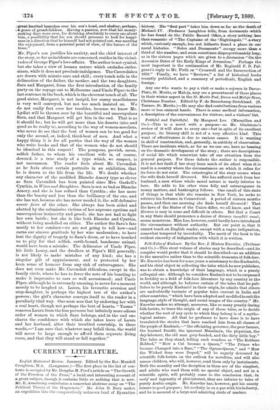Folk - Tales of Kashmir. By the Rev. J. Hinton Knowles. (Trabner
and Co.)—This stout volume of stories may be described—and its compiler would prefer that it should be described—as an addition to the narrative rather than to the scientific treasures of folk-lore. Mr. Knowles has been for some years a missionary to thellashmiris, and his chief object in collecting the tales which he now publishes, was to obtain a knowledge of their language, which is a purely colloquial one. Although he considers Kashmir not to be surpassed in fertility as a field of folk-lore literature by any country in the world, and although he believes certain of the tales that he pnb- lishes to be purely Kashmiri in their origin, he admits that others are undoubtedly variants of popular tales current in India and other countries, "which have been adopted and modified to suit the language, style of thought, and social usages of the country." Mr. -Knowles makes no attempt, moreover, like so many greatly daring folk-lorists, to trace the origin of any of those tales, or to decide whether the root of any cycle to which they belong is of a mytho- logical -nature. All that he professes to have done is to have translated the stories that have reached him from all classes of the people of Kashmir,—" the officiating governor, the poor farmer, the learned Pandit, the ignorant Musalman, the physician, the day-labourer, the old man grey-headed, and the dirty little boy." The tales as they stand, telling such wonders as "The Robbers Robbed," " How a Cat became a Queen," "The Prince who became Changed into a Ram," "The Ogress-Queen," and "How the Wicked Sons were Duped," will be eagerly devoured by scientific folk-lorists on the outlook for novelties, and will also amuse children, who will, however, read them only by instalments. Both the morality and the deception in them are of the simplest, and adults who• read them with no special object, and not in a scientific spirit, will probably come to the conclusion that, in motif and ingenuity of plot-interest, they are inferior to tales of purely Arabic origin. Mr. Knowles has, however, put his scanty leisure to good purpose; his modesty is on a par with his industry, and he is assured of a large and admiring circle of readers.


































 Previous page
Previous page